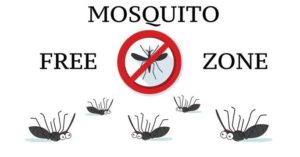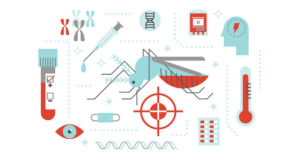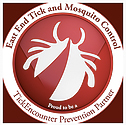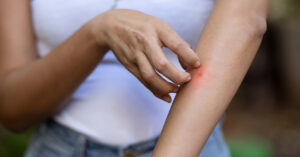 Bug bites are one of summer’s biggest annoyances… right up there with Friday afternoon traffic on the LIE. Mosquito bites are particularly aggravating; their itching and swelling are hard to ignore. Why do mosquito bites itch so much? And what can be done to relieve the misery they cause?
Bug bites are one of summer’s biggest annoyances… right up there with Friday afternoon traffic on the LIE. Mosquito bites are particularly aggravating; their itching and swelling are hard to ignore. Why do mosquito bites itch so much? And what can be done to relieve the misery they cause?
Mosquito bites itch because of a reaction to proteins in the insect’s saliva. When a mosquito bites, it pierces the skin with its proboscis and feeds on blood. At the same time, the mosquito’s saliva is being injected into the skin. When the body registers the presence of the saliva, the immune system sends the chemical histamine to the site of the puncture – which leads to itching and inflammation.
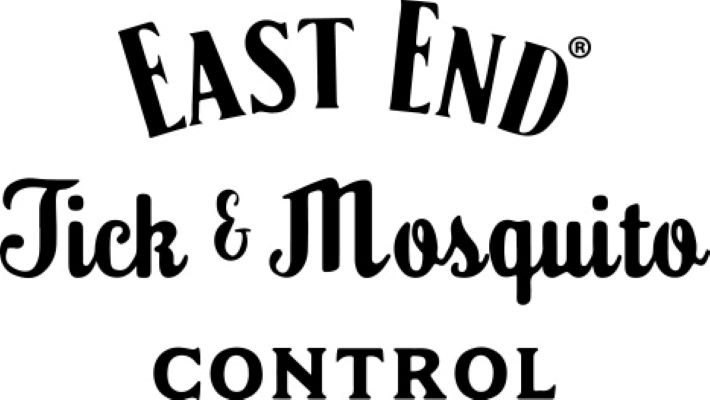
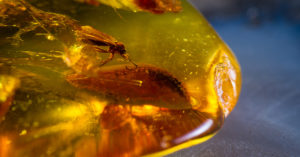 So began the explanation of how a drop of blood extracted from a
So began the explanation of how a drop of blood extracted from a 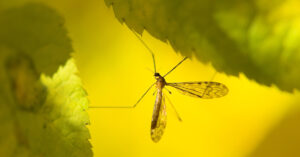 The days are short, the nights are cool, and the leaves are starting to turn. It’s another lovely Long Island autumn day! So why are there still
The days are short, the nights are cool, and the leaves are starting to turn. It’s another lovely Long Island autumn day! So why are there still  In “The Art of War,” Sun Tzu wrote, “If you know the enemy… you need not fear the result of a thousand battles.” The general probably wasn’t thinking of mosquitoes when he wrote his influential treatise on military strategy. However, the wisdom still applies: By understanding how mosquitoes function, we are better equipped to fight them.
In “The Art of War,” Sun Tzu wrote, “If you know the enemy… you need not fear the result of a thousand battles.” The general probably wasn’t thinking of mosquitoes when he wrote his influential treatise on military strategy. However, the wisdom still applies: By understanding how mosquitoes function, we are better equipped to fight them. Do mosquitoes frequently bite you? Does it seem like mosquitoes go after you more when you wear perfume? Or other types of fragrance, like scented lotion? Do you imagine it, or does your perfume attract them? Let’s take a look so you can be appropriately prepared for spring and summer outdoor events.
Do mosquitoes frequently bite you? Does it seem like mosquitoes go after you more when you wear perfume? Or other types of fragrance, like scented lotion? Do you imagine it, or does your perfume attract them? Let’s take a look so you can be appropriately prepared for spring and summer outdoor events.  Not many decades ago, it was commonplace for children to chase the mosquito control truck, running in the street and frolicking in its spray. Those days are long gone, and even though
Not many decades ago, it was commonplace for children to chase the mosquito control truck, running in the street and frolicking in its spray. Those days are long gone, and even though 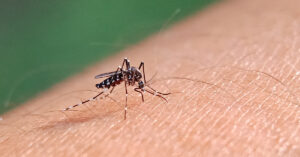 During the summer, you are likely to encounter mosquitoes while spending time outdoors. Mosquitoes are a nuisance and will invade your space and can transmit dangerous diseases. There are many different species of mosquitoes to be aware of when you travel. The team at East End Tick and Mosquito Control® has extensive knowledge of mosquitoes and is here to warn you about three different mosquitoes
During the summer, you are likely to encounter mosquitoes while spending time outdoors. Mosquitoes are a nuisance and will invade your space and can transmit dangerous diseases. There are many different species of mosquitoes to be aware of when you travel. The team at East End Tick and Mosquito Control® has extensive knowledge of mosquitoes and is here to warn you about three different mosquitoes 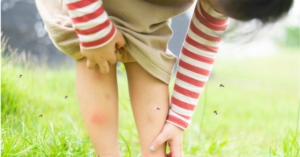 While you are outside enjoying the warm summer sun with family and friends, you can expect to encounter a few mosquitoes now and then. Mosquitoes are not only irritating, but their bite can be itchy and uncomfortable. As Long Island’s foremost
While you are outside enjoying the warm summer sun with family and friends, you can expect to encounter a few mosquitoes now and then. Mosquitoes are not only irritating, but their bite can be itchy and uncomfortable. As Long Island’s foremost 